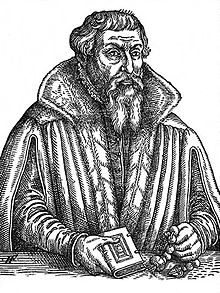- Andreas Musculus
-
Andreas Musculus (1514 – 29 September 1581) was a German Lutheran theologian. The name Musculus is a Latinized form of Meusel.
Musculus was born in Schneeberg, Saxony, "generally called only Musculus"[1] and educated in Leipzig and Wittenberg. He became professor in university of Frankfurt an der Oder. As a theologian he was Gnesio-Lutheran and polemic against the Interim, Andreas Osiander the Elder, Franciscus Stancarus, Philipp Melanchthon and John Calvin.[2]
Musculus was one of the co-authors of the Formula of Concord. He was also one of the most remarkable defenders of Eucharistic adoration in early Lutheranism. His main work on this subject is Propositiones de vera, reali et substantiali praesentia, Corporis & Sanguinis IESU Christi in Sacramento Altaris, Francofordiae ad Oderam, 1573 (thesis IX: An adoratio Christi praesentis in coena sit approbanda). He also edited prayer books with the classical hymns for the adoration of the Sacrament[1]. E.g. his Precationes ex veteribus orthodoxis included Lauda Sion and Pange lingua.[3] He died in Frankfurt (Oder).
References
- ^ Memoirs of the Queens of Prussia By Emma Willsher Atkinson, page 8, available in Google Books
- ^ Andreas Musculus in the Christian Cyclopedia.
- ^ Hardt, Tom G. A. Venerabilis et adorabilis Eucharistia. En Studie i den lutherska Nattvardsläran under 1500-talet. Acta Universitatis Uppsaliensis, Studia Doctrinae Christianae Upsaliensia 9 (Uppsala 1971.) p. 249
External links
- Biography of Andreas Musculus (Schaff-Herzog Encyclopedia of Religious Knowledge)
- Hartmut Lohmann (1993). Bautz, Traugott. ed (in German). Musculus (Meusel), Andreas. Biographisch-Bibliographisches Kirchenlexikon (BBKL). 6. Herzberg. cols. 380–381. ISBN 3-88309-044-1. http://www.bautz.de/bbkl/m/musculus_a.shtml.
Early Lutheran Controversies Name of controversy
Article of FoC resolving itPersons, parties, documents, and topics pertaining to the controversyAdiaphoristic (1548–55) | X. Majoristic (1551–62) | VI. Georg Major · Justus Menius · Nicolaus von Amsdorf · Nicolaus Gallus · Philippists · Gnesio-LutheransSynergistic (1555–60) | II. Philipp Melanchthon · Johann Pfeffinger · Victorinus Strigel · Matthias Flacius · Philippists · Gnesio-Lutherans · On the Bondage of the WillFlacian (1560–75) | I. Osiandrian-Stancarian (1549–66) | III. Andreas Osiander · Johann Funck · Franciscus Stancarus · Philipp Melanchthon · Matthias Flacius · Andreas Musculus · Victorinus StrigelAntinomian (1527–56) | V. · VI. Crypto-Calvinist (1560–75) | VII. Philipp Melanchthon · Augsburg Confession Variata · Albert Rizaeus Hardenberg · Joachim Westphal (of Hamburg) · Martin Chemnitz · Maximilian Mörlin · Philippists · Sacramentarians · Ubiquitarians · Gnesio-Lutherans · The Sacrament of the Body and Blood of ChristDescent into Hell (15??–53) | IX. Predestination (1561–63) | XI. Lutheranism portal Categories:- 1514 births
- 1581 deaths
- People from Schneeberg, Saxony
- German Lutheran theologians
- Lutheran Eucharistic theology
- University of Leipzig alumni
- University of Wittenberg alumni
- Viadrina European University faculty
Wikimedia Foundation. 2010.

